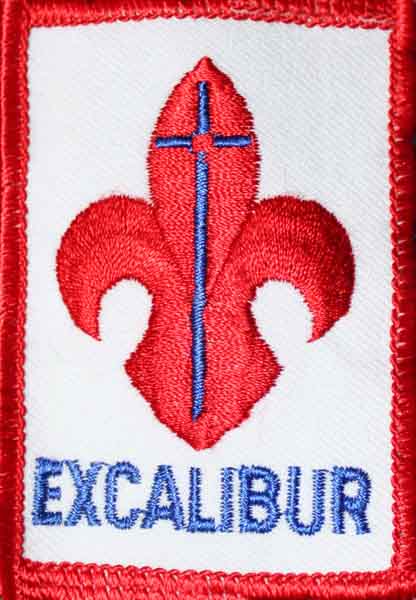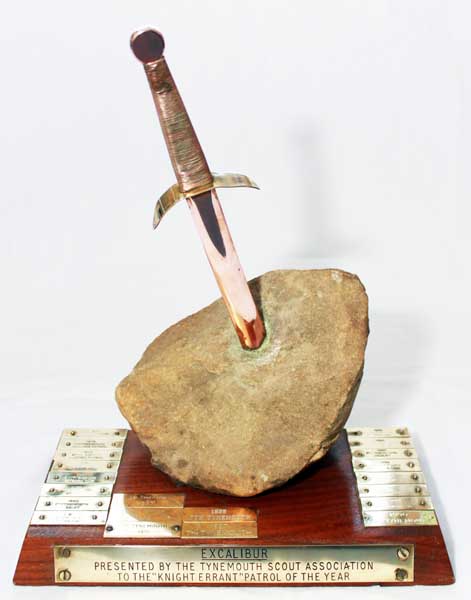No mention of competitions and the 3rd Tynemouth could be complete without talking about Excalibur.
Most people think the story of Excalibur is to do with King Arthur and the knights of the round table, the truth is slightly different to that as Harry Rose explains:
The idea began while I was getting my hair cut in Bob Robson’s shop way back in about 1971/72.
Bob was talking about the old days when those becoming King’s Scouts had a midnight vigil in Christ Church. We were both bemoaning that things were not as they were in OUR days.
I spoke of reading the Scout magazine and doing the badge tests that were detailed in it, and of the articles by ‘Skipper’ who suggested that scouts should practise reasonable behaviour and help people all the time. We played with the idea for some time and we felt that something should be done on a patrol basis to show that scouts could still do the right things!!. I said that I would put something together and speak to the District Commissioner, Colin McKay.
At this time I was doing a night class at Ralph Gardiners school on copper working. I made a sword from copper bar and turned the lower half into a rod.
A piece of sandstone, collected from a farm we camped at in Rothbury, was chipped into a sort of triangle and mounted on a base of polished wood. A hole was drilled into the rock and the sword, by now it was “Excalibur“, was glued into it.
I had roughed out an idea for “knightly duties” that a patrol could do. The patrol would go out for a weekend camping and cover a given distance. All the patrol would have to participate in the activities and to be able to show this. The idea was co-operation and allowing everyone to use their particular abilities. A good deed would have to be done along the way and the recipient would be asked to write a report upon it.
A log must be kept and every member of the patrol had to show their activity. The log should describe the land covered and the activities of each day. Pictures and sketches would be of help and be used in judging the final effort.
The whole idea was that a patrol would be out in the country, achieving given objectives and working as a team. Allowing and encouraging each member to use their particular abilities in the team effort. Leadership and initiative, kindness, understanding, determination would all be needed if the patrol was to succeed as a team. Each patrol was to be judged by the log book they returned and how much the patrol had worked as a team. The report from the recipient of the “good deed“ would also be of importance.
I took this collection of ideas to Colin McKay who suggested a few changes in light of modern ideas and common sense. One could not always have a full patrol for a multitude of reasons. What constituted a task would have to be looked at and discussed. But he thought that the idea was sound and that I should go ahead. So I did, and produced the Trophy for competition for the borough of Tynemouth Scouts.
The rest is history. Deeds were done! Young people did things and will still remember them and their part in them. Some young people found and showed skills and courage that they were not sure of before. I judged the first patrols and still remember the pride that I felt in those young people. More importantly I remember the pride on their face when they described their adventures. That’s what it was all about.
Ritson’s Review in May 1977 adds to the story:
The Excalibur trophy, which we hold, was made and donated by guildsman Harry Rose and the idea behind the competition was devised by Harry and Bob Robson, so rightly the guild have a proprietary interest in this competition.
This competition is considered to be the hardest of all, with considerable work involved at all stages: planning and preparation, the actual hiking and camping, the jobs done en route and the log book which must be to a very high standard.
The guild have kindly offered to foot the bill for a set of special badges for the district so that everyone who has taken part in this demanding competition will be presented with this distinctive badge in recognition of taking part.
In 1979 a roll of honour was produced by guildsman Wilson Thompson listing all of the Group’s entrants to the competition. That roll is still displayed in our headquarters to this day.

